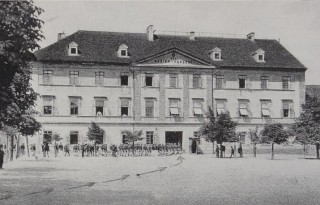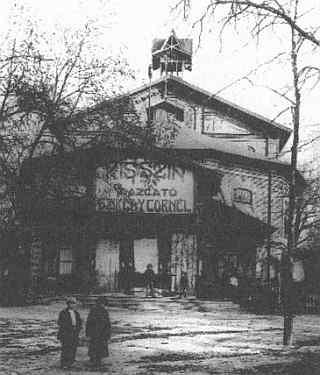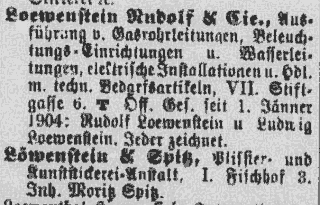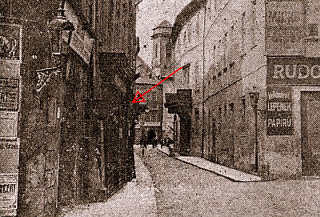
Mariánská kasárna in CB (Budweis). Until 1 June 1915 it was the home of the Good Soldier Švejk's Infanterieregiment Nr. 91. In 1915 Jaroslav Hašek also served with the regiment in these barracks.
The novel The Good Soldier Švejk refers to a number of institutions and firms, public as well as private. On these pages they were until 15 September 2013 categorised as 'Places'. This only partly makes sense as this type of entity can not always be associated with fixed geographical points, in the way that for instance cities, mountains and rivers can. This new page contains military and civilian institutions (including army units, regiments etc.), organisations, hotels, public houses, newspapers and magazines.
The line between this page and "Places" is blurred, churches do for instance rarely change location, but are still included here. Therefore Prague and Vienna will still be found in the "Places" database, because these have constant coordinates. On the other hand institutions may change location: Odvodní komise and Bendlovka are not unequivocal geographical terms so they will from now on appear on this page.
The names are colour coded according to their role in the plot, illustrated by these examples: U kalicha as a location where the plot takes place, k.u.k. Kriegsministerium mentioned in the narrative, Pražské úřední listy as part of a dialogue, and Stoletá kavárna, mentioned in an anecdote.
 Institutions index of institutions, taverns, military units, societies, periodicals ... (288)
Show all
Institutions index of institutions, taverns, military units, societies, periodicals ... (288)
Show all I. In the rear
I. In the rear  14. Švejk as military servant to senior lieutenant Lukáš (14)
14. Švejk as military servant to senior lieutenant Lukáš (14) II. At the front
II. At the front  1. Švejk's mishaps on the train (15)
1. Švejk's mishaps on the train (15) 2. Švejk's budějovická anabasis (38)
2. Švejk's budějovická anabasis (38) 3. Švejk's happenings in Királyhida (44)
3. Švejk's happenings in Királyhida (44) 4. New afflictions (26)
4. New afflictions (26)



|
III. The famous thrashing |
 | |
2. In Budapest | |||
 | Kis Színkör |  | |||
| |||||

Kis Színkör is mentioned in a comment by Hauptmann Ságner who read in Pester Lloyd that the actress Weiner was to perform there.
Background
Kis Színkör (Small Theatre) was a theatre and cabaret in Városliget (City Park) in Budapest. It was founded in 1904.
Quote(s) from the novel
[III.2] Zklamal se však úplně, neboť hejtman Ságner, kterému přinesl batalionsordonanc Matušič ze stanice večerní vydání „Pester Lloydu“, řekl, dívaje se do novin: „Tak vida, ta Weinerová, kterou jsme viděli v Brucku vystupovat pohostinsky, hrála zde včera na scéně Malého divadla.“
Credit: László Polgár
Also written:Small TheatreenVesle TeaternnMalé divadloczKleines TheaterdeKis Színkörhu
Literature
- Colosseum (Kis Színkör) , ,1923
 | Firma Moritz Löwenstein |  | |||
| |||||

Firma Moritz Löwenstein was a company from Vienna who delivered religious gadgets. Here Offiziersdiener Baloun was eating little balls from a rosary manufactured by them, and the firm supplied Klokoty as well. The author mentions in [I.11] Firma Moritz Mahler as a similar company.
Background
Firma Moritz Löwenstein can not be traced in the address book of Vienna 1915. Presumably these names have been picked fairly randomly apart from the common Jewish first name Moritz. See Firma Moritz Mahler.
Quote(s) from the novel
[III.2] A opravdu, Baloun ve svém největším hoři hledal spásu v drobných kuličkách z klokočí od firmy Moritz Löwenstein ve Vídni. „Ten je taky z Klokot,“ řekl smutně Baloun. „Než mně ho přinesly, zařvala dvě housata, ale to není žádný maso, to je měkkotina.“
 | U staré paní |  | |||
| Praha I./441, Michalská ul. 11 | |||||
| |||||

U staré paní was the pub where lathe operator Matějů had his jaw smashed by a brick. This is Švejk commenting that Mr. István was hit in they eye with a chicken.
Background
U staré paní was a pub in Staré město, now a restaurant and hotel.
Quote(s) from the novel
[III.2] To vyrazili ,U starý paní’ soustružníkovi Matějů celou sanici cihlou za dvacet zlatejch, s šesti zubama, a tenkrát měly peníze větší cenu než dnes.
Literature
- Románové restaurační a jiné zábavní podniky, ,2009 - 2021
- Z mé staré zlaté Prahy, ,1946
 | Filipa |  | |||
| |||||
Filipa is part of Švejk's perception of Leutnant Dub's quote from Shakespeare on Philippi. In a conversation with cook Jurajda he concludes that Dub is a "buserant" (homosexual).
Background
Filipa was by interpreting the text a meeting place for homosexuals, surely somewhere in Prague.
Quote(s) from the novel
[III.2] „Pro nás, poslušně hlásím, pane lajtnant. Podívejte se, co má sádla.“ Poručík Dub odcházel bruče: „U Filippi se sejdeme.“ „Cože ti říkal?“ obrátil se k Švejkovi Jurajda. „Ale dali jsme si schůzku někde u Filipy. Voni tihle vznešení páni bejvají obyčejně buseranti.“



|
III. The famous thrashing |
 | |
2. In Budapest | |||
| © 2008 - 2024 Jomar Hønsi | Last updated: 20.11.2024 |


